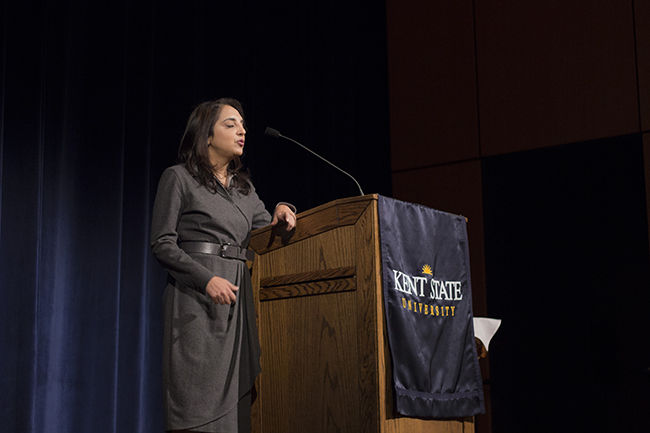Business professor stresses importance of choices
Sheena Iyengar, keynote speaker at the Spirit of Women in Business Conference, discusses choices in the Kiva on Wednesday, March 4, 2015.
March 4, 2015
A professor at the Columbia Business School broke down the process of making choices during the fifth annual Spirit of Women in Business Conference hosted by the College of Business Administration on Wednesday.
Sheena Iyengar, S.T. Lee Professor of Business in Columbia’s management division and is known for her research on choice and strategy, said choice is what defines a person’s life and the direction it will take.
“It is only when you tell the story of your life in terms of choice that it gives meaning to everything you say and do,” she said.
Iyengar began her presentation by telling listeners three versions of the story of her birth. First, her fate was predetermined in that moment. Second, chance brought everything together. Third, choice is what brought her into the world at that place and in that time.
She described the decision-making process in three main points: see choosing as the act of creation, be choosy about choosing and develop informed intuition about a domain of experience.
It is important to pay attention to the amount of options presented. Having too few options limits the creativity and success, Iyengar said, but she also cautioned that having too many options could have the same effect.
The decision makers in companies often feel as if they are picking between two options, when in reality, “the job of the leader and the chooser is not to think of choosing as an act of picking but an act of creating,” she said.
In regards to the benefits choices have on a company, she quoted Paul Nutt’s study on decision-making that showed that when CEOs made decisions with only one alternative, there was a 52 percent failure rate. However, when another option was added, the failure rate dropped to 32 percent.
She also highlighted the effect that having too many choices can have. Iyengar said having too many choices could cause a delay in a decision, a likelihood of making bad choices and a lack of satisfaction with the choice.
This is why Iyengar advised attendees to be “choosy about choices.” She suggested listeners “limit yourself to your top three to five (choices), no more than five that you are making your highest priority.”
She also told the audience to not “try to be that person that does everything; no one will remember all the things you did anyway. Focus on those few things where you can do the best value added.”
In doing this, one is able to develop “informed intuition,” which she said comes from experience and practice.
Vicky Wesig, a junior on Kent State’s Stark campus, described Iyengar’s presentation as “phenomenal” and “informative.”
Michael Duchon, an assistant professor in the management and information systems department and one of the 30 male attendees out of the 322 total reservations, said he thought the presentation was outstanding. He said he was reminded of a merry-go-round because people seem to rely “less on intuition and more on experience” in the workforce.
Iyengar concluded by telling listeners that it is important to “balance an understanding of the possibilities and a clear eye of assessment on the limitations,” and make choices based the conclusion.
“Don’t be afraid to lead. Don’t be afraid to create. Remember that the modern hero is no longer the chosen one, but the one who chooses,” Iyengar said. “She is self-made. That is she has made herself through her choices because she is the sum of all her choices. And it is as she makes a few careful choices day in and day out, she transforms her life, and those of others. And this is how we create our most beautiful and singular selves.”
Contact Ellie Enselein at [email protected].
























